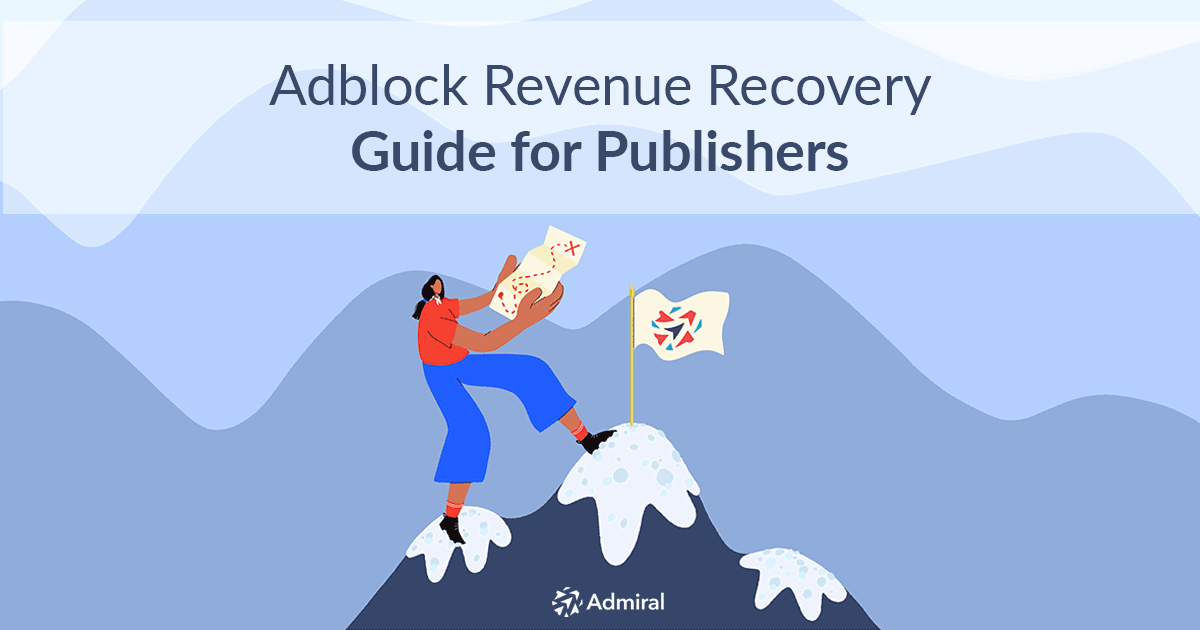Advertising is the underpinning of free content across numerous websites. For years, content sites have relied on ad revenue to sustain themselves. However, in today's digital landscape, it has become increasingly important to convince users to whitelist websites.
If your website is seeing reduced revenues because of adblockers (and it almost certainly is), here’s how you can encourage visitors to whitelist (allowlist) your website or turn off their adblocker.
Educating Users: The Crucial First Step
One effective way to increase ad acceptance is by educating users on the importance of advertisements for your website. Many visitors, especially those who frequently visit your site, may be willing to support it in a small way. By explaining how advertising plays a crucial role in providing free content, you can encourage users to understand and appreciate the need for ads.
Craft concise and clear messages that emphasize the vital role of ad revenue in financially sustaining your website. Emphasize that whitelisting is not a passive action but a conscious decision to support continuous access to valuable content.
For example, Legacy.com reminds visitors of their shared mission, and why the content has value: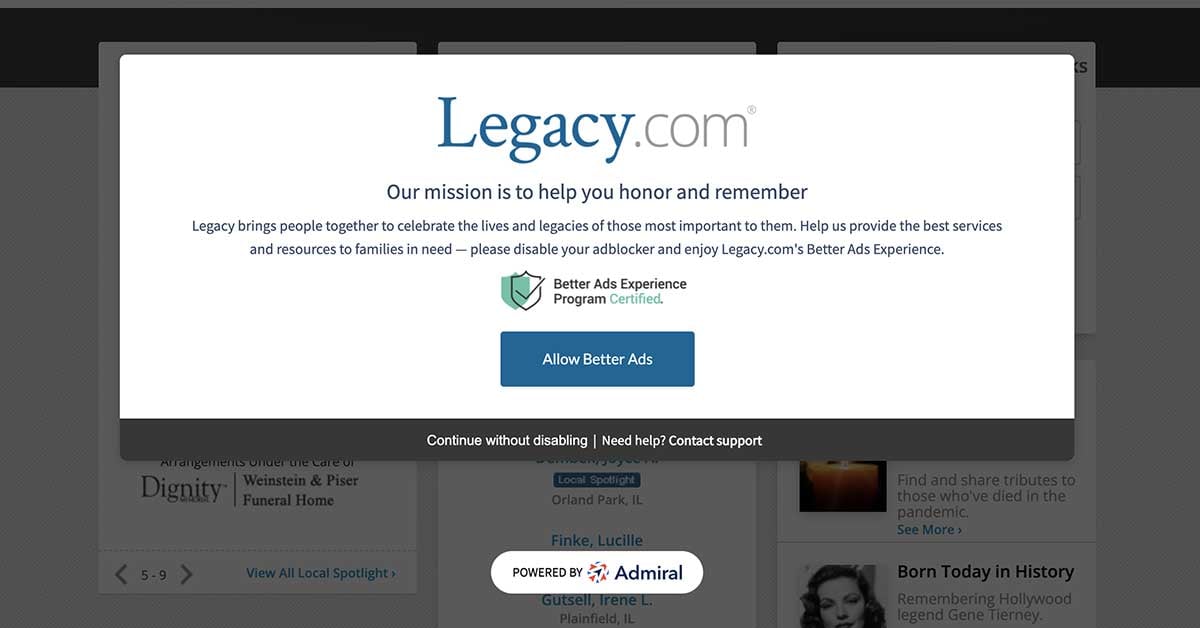
For Rotten Tomatoes, they start with a Welcome, conclude with a Please, and are transparent that ads aren't everyone's favorite thing, but help to fund the content their visitors appreciate:
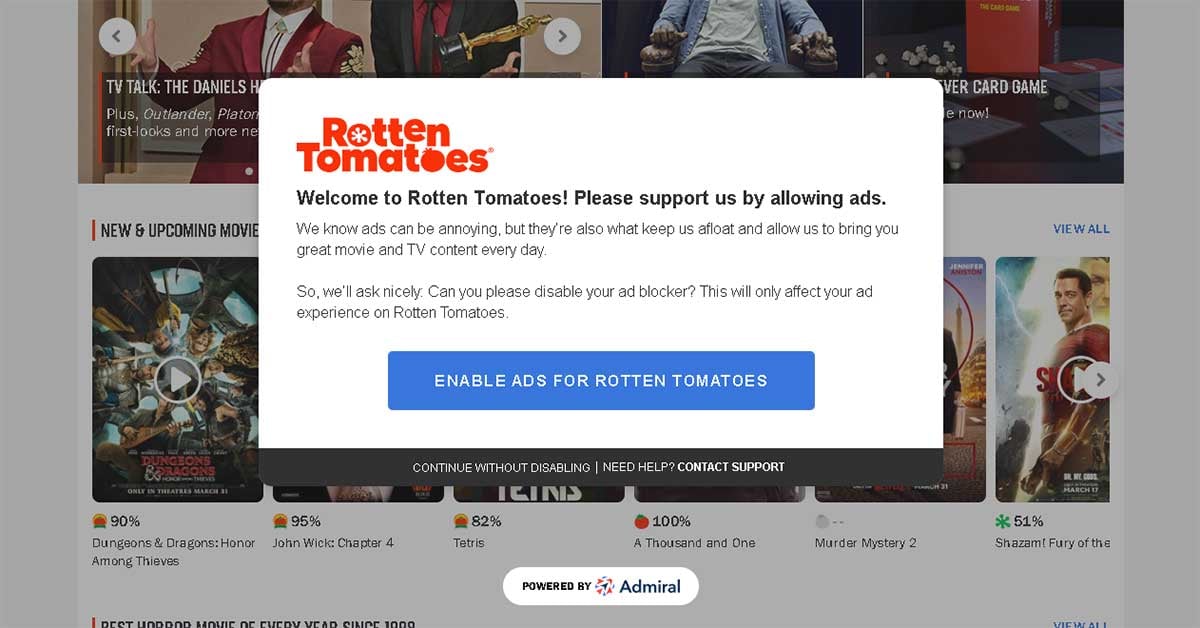
Audit and Improve the Ad Experience
Embrace ad formats that are user-friendly and seamlessly blend with your content, such as native ads and static banners. It's important to avoid disruptive ad types like pop-ups, auto-play videos, and interstitials, as they can frustrate users and lead them to use adblockers.
Some additional suggestions to improve the ad experience:
- Adopt a visitor-first approach and build the relationship for the long term.
- Avoid the most annoying 'bad ad' formats.
- Give visitors a choice of how they want to support your site, with a tool like Admiral's value exchange. Whitelist, subscribe, email signup, ad-free short-term passes, and more.
- Establish a limit for the number of ads per page.
- Improve ad viewability and ad load times.
- Survey your visitors to understand their highest priorities to make changes before losing valuable traffic or driving them to install an adblocker.
Facilitating the Whitelisting Process: Simplify and Guide
To bridge the gap between users who are willing to whitelist your website but don't know how to do so, it is essential to provide clear and user-friendly instructions. Incorporating one-click whitelisting options can further simplify the process. One effective solution to aid both you and your users in this regard is Admiral.
Admiral's adblock recovery tool is specifically designed to streamline the whitelisting process. It offers animated guides on how to whitelist a website across all major adblockers, ensuring that users can easily follow the instructions.
Additionally, Admiral provides live support to publishers' end users, especially those who may use multiple adblockers or lack technical expertise. With Admiral's assistance, whitelisting becomes a hassle-free experience for your users.
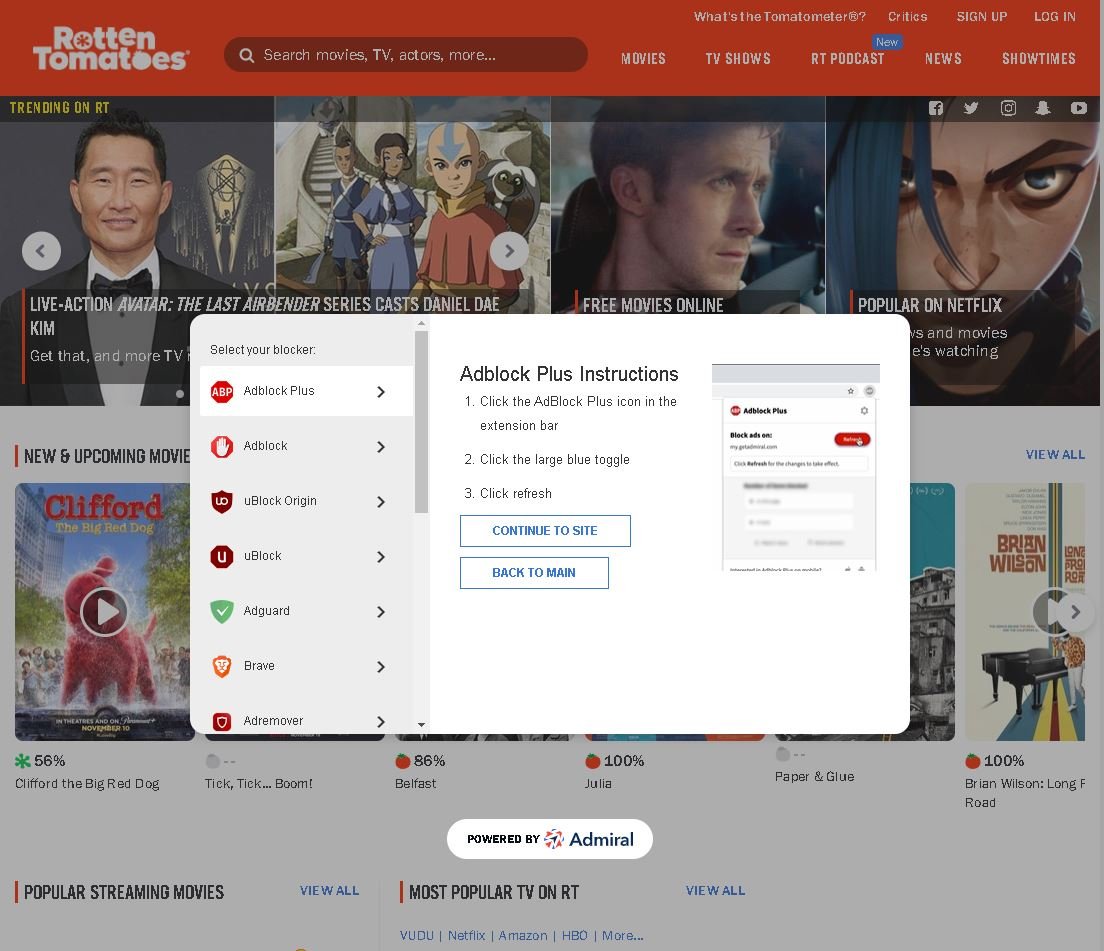
Ensuring Quick Page Load Times: Efficiency Matters
Advertisements might slow page load times a little, but make sure they don’t substantially delay your website’s pages from loading. Users who can’t quickly see a site might not just block ads -- they might not visit your site altogether.
Prioritize efficiency by optimizing your site for speedy loading. This includes both using fast-loading ad formats and optimizing other aspects of the site for speed. What little speed you lose to advertisements can likely be regained somewhere else.
Use Google's Page Speed Insights tool and Core Web Vitals scoring to optimize your site performance.
Questions about Adblock Recovery?
Check out our comprehensive Adblock Revenue Recovery Guide
Personalized Ad Content: Tailored to User Preferences
Users may be more willing to whitelist your site if the ads are meaningful to them. That usually means using targeted advertising that’s personalized to their interests and preferences. Tailored ads are perceived as less invasive and more valuable.
As the digital landscape evolves, publishers have a golden opportunity to adapt and thrive. With Google phasing out third-party cookies, now is the perfect time to explore new avenues for collecting visitor information.
Even if you don't have a newsletter, there are innovative ways to engage with your audience. One such method is the use of hashed emails (HEMs), which offer practicality and potential for growth.
Admiral, a leading email collection solution, provides a range of tools and strategies to help you quickly expand your email signups. Don't miss out on this chance to build stronger connections with your visitors.
Using Admiral's email collection tools, WorldPopulationReview added over 87,000 emails in a few months.
/Case%20Studies/worldpopulation_email-collection_1000p.png?width=1000&height=524&name=worldpopulation_email-collection_1000p.png)
Leverage the Better Ads Standard and Certification
Commit to the Better Ads initiative that outlines and champions non-intrusive ad formats. Aligning with these standards not only enhances ad perception but also encourages users to whitelist your site due to the quality assurance it represents.
The Better Ads standard has specific criteria for different types of ads, including text ads, image ads, in-feed ads, search ads, desktop carousels and more.
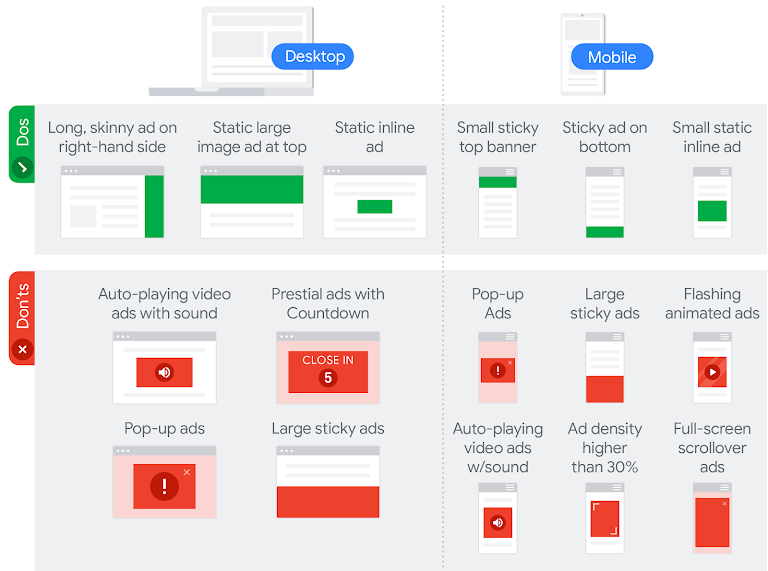
Additionally, let your visitors know with the Better Ads Certification Program. This can build trust, and encourage your ad-sensitive visitors to whitelist.
Check out this Better Ads Certification case study about how publishers grew their recovery even more by promoting that they follow the Better Ads standard.
Respecting User Privacy: Transparency and Compliance
While many users will be happy to receive personalized ads, some may want to keep their information private. This prevents targeted advertising but must be respected.
Transparently communicate your data collection practices and rigorously comply with established privacy regulations, like GDPR and the US Privacy Signal. If someone opts out of cookies, make it easy for them to do so.
Admiral is an IAB and Google-approved Consent Management Platform (CMP) for sites that need either GDPR or US Privacy Signal compliance. Find out more about Admiral's Privacy Consent solution.
Providing Valuable Content: The Core Attraction
Continue to invest in captivating, value-laden content. Content that speaks to and engages users inherently inspires support, prompting users to either whitelist your site or disable their adblockers voluntarily.
Plus, quality content will additionally keep visitors returning. It doesn’t do your site any good if visitors whitelist the site but then don’t come back.
Engaging with Your Community: Building a Supportive Environment
Maintain open lines of communication with your audience. Listen and respond to feedback, engage in forums, comments or social media to foster a sense of community and belonging. This will increase visitors’ willingness to help your site, and it’ll tell you what visitors accept and what they don’t like.
If your site has a forum, give advanced notice to your forum admins and leaders about upcoming changes. Share the reasons and narrative about a decision to use anti-adblock tools, or launch a paid subscription.
Your readers are fans of your content, and adblock visitor surveys show most are willing to support publishers in some fashion. Admiral can give you multiple levers to find the right value exchange with them.
A/B Testing: Finding What Works
A/B test each change to evaluate the effectiveness of your whitelisting strategies. This systematic approach will show what appeals to your audience, guiding you as you continually optimize messaging and ads.
With Admiral's MaiGIC™ ChatGPT-integrated AI and machine-learning tools, publishers can use AI to create multiple CTA offers, based on tone and context. Then, Admiral can automate A/B test messaging, pick the winner, spin out a new test, and keep optimizing conversion rates.
/Admiral_AI_MaiGIC_graphic.png?width=1200&height=628&name=Admiral_AI_MaiGIC_graphic.png)
Continuous Monitoring and Adaptation
Adopt a proactive stance by consistently monitoring adblock usage and whitelisting rates, and also actively seeking and analyzing user feedback. Leverage data to maximize how many visitors whitelist your website.
Admiral's industry-leading Adblock Analytics dashboard is free for any publisher to add. You can then monitor block rates, recovery rates, revenue impact, and much more.
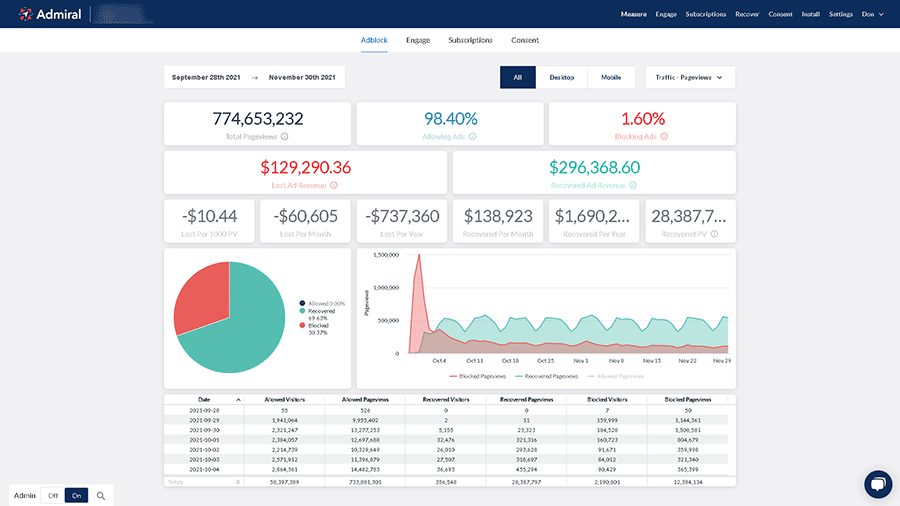
Admiral: Expertise in Growing Visitor Whitelisting
Admiral offers more features, levers, and strategies built to grow the number of visitors whitelisting our website. Multiple layers of engagement configuration, such as soft/dismissible, metered, hard, combinations, frequency adjustments, and failsafe for the most aggressive adblockers.
Additionally, Admiral offers:
- visitor support and instructions,
- robust blocker analytics,
- sophisticated adblock detection, and
- a dedicated Customer Love team to help publishers reach their objectives.
Schedule a consultation today:


